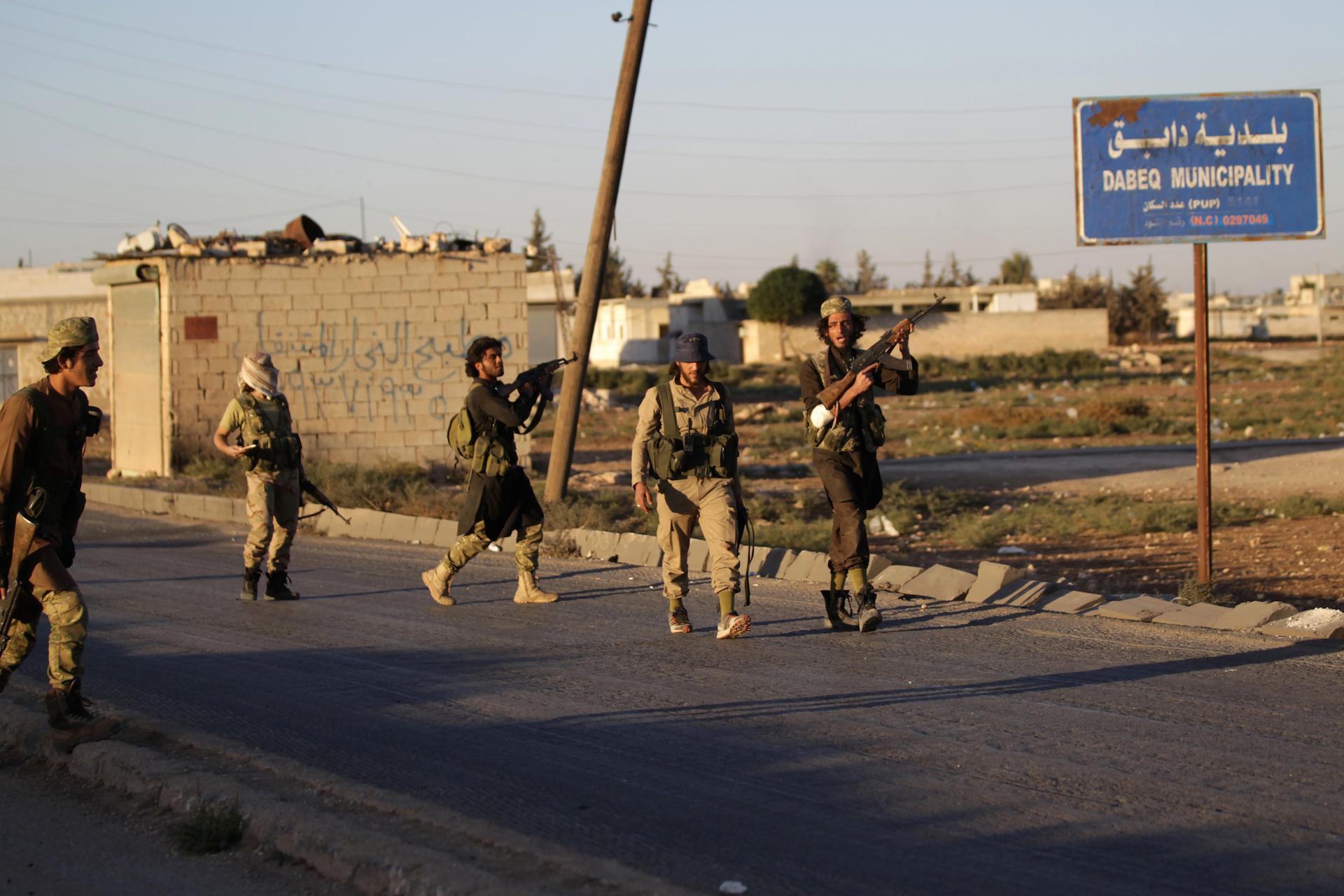Rebel fighters walk with their weapons in Dabiq, northern Syria after driving out ISIS on Oct.16, 2016.
The Islamic State is shrinking, fast.
Thousands of Iraqi and Kurdish troops are closing in on Mosul, the largest city under ISIS control. The terror group is losing ground to Turkish-backed rebels in northern Syria and being pummelled from the air by a US-led international coalition.
Since January 2015, the self-proclaimed caliphate's territory has shrunk by nearly a third. What’s more, the extremist group is losing battles of deep ideological significance. In particular, its image among supporters as the bringer of the apocalypse has been shattered.
That’s right — ISIS is suffering a branding crisis.
A stark example of this crisis was evident in the aftermath of the group’s loss of Dabiq, in northern Syria, last weekend.
The small village, just a few miles from the Turkish border, might not seem like a big deal. But ISIS — citing a certain reading of Islamic texts — had promised it would be the location of a final battle between Muslims and Christian invaders. ISIS would be the ones to fight this battle, its followers were told. The group even named its English-language magazine after Dabiq.
When they were kicked out of the town by Turkish-backed Syrian rebels, it gave the group’s propaganda arm a dilemma. The world did not end. They looked silly.
“Dabiq was an important part of the narrative of Islamic State’s story,” says Shiraz Maher, senior research fellow at King’s College London’s International Centre for the Study of Radicalisation and author of “Salafi-Jihadism: The History of an Idea.”
“In terms of marketing, to its own supporters and members, to say ‘look, the prophecies are all coming true, and here we are carrying them out in real time,’ it played a significant role in that sense. … Now the fact they have lost it, there is some ridicule that has taken place and it does undercut their narrative extensively.”
It was that narrative that attracted so many impressionable young men around the world, who traveled to Syria and Iraq to join the group.
“They were seen to be the winning team and that was attracting people to them,” Maher says. “So now that you can’t have that narrative anymore, actually you are sort of shaking and shrinking, it’s harder for them to be able to project those things.”
So what happens when that no longer works?
ISIS is nothing if not adaptable. In the face of a shrinking caliphate, they have moved the goalposts, Maher says.
“Well the narrative has changed a little bit insofar as they have rationalized it in various senses. Part of their rationale is that [they] make the effort, but God delivers results. ‘We tried our best and God, for whatever reason, chose for us not to have this victory.’ So there is a fatalism that comes about. There is also a sense that they are saying ‘land is not important, we can operate without land.’”
Maher says that a different kind ofgroup will likely emerge after this phase.
“We tend to think of ISIS in these static terms. The point is they can be a solid, liquid and gas all at the same time. I.e. they are a terrorist group, they are an insurgency and they are a proto state. So losing territory will just mean they will morph back into nonetheless quite potent forms,” he says.
“So you may get an army into Mosul and declare victory, but that is just signaling the next phase of what I’m sure will be quite an intense guerrilla insurgency against whichever forces are holding it. … I think we’re a long way from the end.”
Every day, reporters and producers at The World are hard at work bringing you human-centered news from across the globe. But we can’t do it without you. We need your support to ensure we can continue this work for another year.
Make a gift today, and you’ll help us unlock a matching gift of $67,000!
